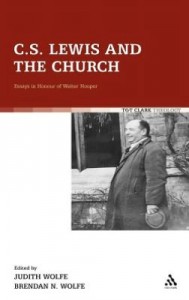Editor’s note: We pleased to publish this review (in two parts–look for the second tomorrow!) by friend of Mere-O Dr. Thomas Ward.
C.S. Lewis and the Church: Essays in Honor of Walter Hooper
Edited by Judith Wolfe and Brendan N. Wolfe
London and New York: T&T Clark International, 2011
208 pages, hardcover
$110.00
C.S. Lewis scholars and enthusiasts are indebted to Judith and Brendan N. Wolfe for editing (and contributing to) this fascinating collection of essays on Lewis on the Church. The quality of the contributions is, on the whole, unsurprisingly excellent, given the impressive list of contributors.
Worthy as the Wolfes’ work is, we are far more indebted to Walter Hooper, the man most responsible for preserving Lewis’s legacy over the 49 years since Jack passed out of the shadowlands. In his capacities first as Lewis’s personal secretary and then as his literary executor and editor of essay collections and the Collected Letters, no Lewis scholar is more deserving of a festschrift than Hooper; it is meet and right that he now has one. But, as Andrew Cuneo’s introductory essay persuasively argues, Hooper ought to be remembered not only as a scholar of Lewis but also as his dear friend.
When I was a student at Oxford and Head Resident at the Kilns, I had the pleasure to speak with Hooper about C.S. Lewis several times. I was struck by his generosity, kindness, and joy, and came away with a deep admiration for him. While the Lewis enthusiast in me is glad for the publication of this book, the Hooper admirer in me is glad that it is dedicated to his honor.
In thinking about Lewis and the Church, it is easy for non-theologians like myself to conflate two distinct kinds of questions. The first is whether Lewis’s theology and spirituality align him more or less closely with the theology and spirituality of this or that Christian church. The second is, what is Lewis’s ecclesiology? From this question derive questions like the following: what does he think the Church is, where does he think it is located, what is its job, what is the relationship between the Church and all the churches? and so on. When people ask, “Was Lewis a (crypto-) Catholic/Evangelical/Orthodox/Calvinist/Etc.?” they will usually have the first kind of question in mind. It’s worth asking this sort of question, but in as broad and generous a thinker as Lewis was the data are bound to yield conflicting results, as indeed they have. More fruitful approaches to this first sort of question are found in this book, for instance in the essays by James Como, Ian Ker, Kallistos Ware, Christopher Mitchell, and Philip Ryken, which proceed by way of comparison and contrast rather than by checklist.
However, the second kind of question is, to my mind, where the action really lies. For profitable answers here, look especially to the essays by Michael Ward and Judith Wolfe, along with Brendan N. Wolfe’s essay on Lewis’s ecumenism. The concurrence of Ward and Wolfe is striking: for Lewis, really and truly the Church exists only in heaven, and the churches here are at best training grounds for heaven, helping us through their negative example as much as their positive.
As exhilarating as Lewis’s picture of perfect communion is at the close of The Last Battle, the end of Perelandra, and The Great Divorce, Lewis’s picture of the earthly churches is starkly pessimistic. Lewis’s best portrayal of Christian community life here below, St. Anne’s in That Hideous Strength, meets not in a church but a house, and has not a pastor or priest but a Director.
In the following I offer brief descriptions of most of the essays, and delve a little more deeply into a few. The selection of these lucky few follows my own interests and should not be viewed as a slight to the others. The editors divide the essays into three parts, which is reflected in my use of subheadings.
Login to read more
Sign in or create a free account to access Subscriber-only content.